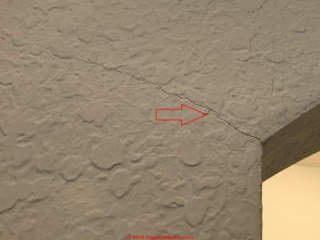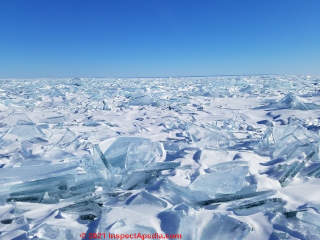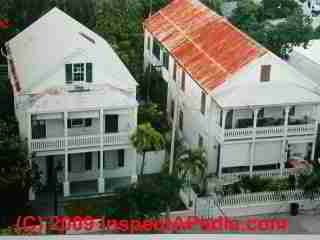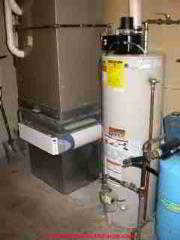 Banging or Booming Noise Complaints
Banging or Booming Noise Complaints
Bang / Boom Noise
Sources, Causes, Cures
- POST a QUESTION or COMMENT about diagnosing the source and finding the cure for banging or booming noises or sounds in or around buildings and their plumbing or mechanical or other systems
Building bang or boom noise troubleshooting: causes & cures.
Here we provide an extensive catalog of the sources of annoying banging or booming sounds or noise complaints at or around buildings.
These articles discuss building noise control: how to inspect, diagnose & cure noise or sound problems in homes or commercial buildings.
InspectAPedia tolerates no conflicts of interest. We have no relationship with advertisers, products, or services discussed at this website.
- Daniel Friedman, Publisher/Editor/Author - See WHO ARE WE?
How to Identify & Cure Banging or Booming Noises & Sounds in or Around Buildings
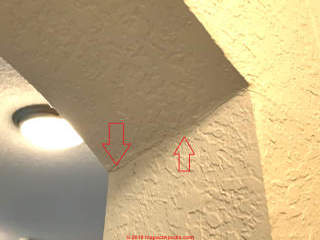 Booms, booming noises: aside from obvious boom noises traced to explosions or perhaps to an oil burner puffback explosion, methane gas explosions, and similar explosive causes, sounds coming from the ground, including loud booms, moaning, humming, and other sounds coming from the ground may be due to "stretch movement noises" due to tectonic plate movement.
Booms, booming noises: aside from obvious boom noises traced to explosions or perhaps to an oil burner puffback explosion, methane gas explosions, and similar explosive causes, sounds coming from the ground, including loud booms, moaning, humming, and other sounds coming from the ground may be due to "stretch movement noises" due to tectonic plate movement.
But unless we have evidence of nearby sinkholes or mining activities, before assuming that a booming or banging noise is originating in the ground below a property, there are other bang/boom noise sources to be investigated and ruled out. We will list those in this article.
Photo: fine stucco cracks in the building whose booming noise complaint is discussed just below.
[Click to enlarge any image]
Question: loud booming noise complaint, building cracks - sinkhole?
We manage a town home that is an end unit here in Florida. The renter complained of loud noises happening mostly at night and early morning, after a period of weeks of heavy rain.
I noticed small cracks in three successive doorways upstairs which may or may not be related.
We’ve sent the insurance co, roofers, pest control, association management, handymen, and even the fire department and nobody can figure it out. It’s loudest inside, unpredictable, the neighbors have heard it through their walls and I heard it twice myself.
The renter moved out because of it, the owner wants to sell, but obviously we need to determine what the issue is and correct it. There are some hairline cracks in the stucco around the building at windows on the ground floor.
I’ve called structural engineers and inspectors, and they have said they can’t help me. Is there a company that can check for sinkhole potential, and/or use sound equipment to identify where the noise is coming from? - B.N., Florida, 2018/10/08
Reply: property specifics can help suggest bang / boom noise sources
Thank you for asking such an interesting, if also frustrating and difficult question about tracking down and diagnosing the sounds you describe;
Any guesses I'd offer based just on your e-text would be such wild speculation that even if I were right it'd be luck not smarts; and I want to avoid misdirecting your energy.
In tracking down a noise source in or near a building it's helpful to have specifics about the property not included in your original question, such as:
- Property location - later given as Miramar, Florida
- Property age - later given as built 2002
- Property construction - later given as a "town home" presumably but not necessarily wood frame construction with attic, crawl space or slab was not distinguished.
- Presence of any surrounding problems, events, equipment, companies, that might explain the noise.
After ruling out obvious and immediate safety hazards (as I will detail below), check also for structural damage that might or might not be related to the noises.
The hairline interior and exterior stucco cracks shown in your photos are so common that without other data one would not assume those are due to property subsidence.
A more thorough inspection for signs of cracks and movement beyond just the photos might indeed change that view.
Identify a problem pointing to a costly repair.
For example, thermal expansion of metal ductwork can cause sudden loud boom noises in a building but would be rather easy to correct.
See BANGING NOISE at AIR HANDLERS or in DUCT SYSTEMS
See also THERMAL EXPANSION of MATERIALS
A Sound Log Helps Find Noise Sources
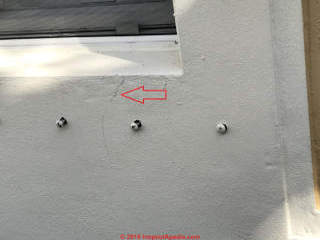
When we don't know where a sound is originating there are some helpful steps such as keeping a log of
- Time of day when noise occurs
- Weather, temperature, wind
- Operation of mechanical equipment, appliances
- Other details
Details about how to do this are at HOW TO USE a SOUND EVENT LOG
I speculate that while it's possible, it's not highly likely that very loud booming noises under or around a home and that were traced to sinkhole subsidence would have occurred without more obvious surface indications;
Yes you could also contact a geotechnical engineer who has expertise and access to equipment used to scan for hidden sinkholes or other formations under ground, and that's a reasonable next-step, but
Watch out that you don't let attention get captured by a single idea such that we miss something more critical and ultimately more-accurate
Watch out also when consulting anyone about a difficult problem like this as people don't necessarily recognize nor tell you about the limitations of their expertise.
OPINION: For example an "engineer" may have certification and a degree in a narrow specialty - electrical engineering - but she (or some) may still practice out of and take questions out of her specialty area.
Reader Follow-up: Booming noise at a town home, end unit, built in 2002 in Miramar, Florida.
This is a town home, end unit, built in 2002 in Miramar, Florida.
I believe the first floor is concrete block/cbs and upstairs has plywood flooring under the carpet and is likely stucco over frame. The renters lived there for over 3 years, and the noise wasn’t an issue until after Memorial day this year.
They moved out 2 months later due to the noise. Since the renters moved out, there has been no noises heard by the neighbors. The renters kept the unit very cold with the a/c. The noises began after a 2 week period of heavy rain.
The renters said it varied in volume/intensity and sometimes happened in rapid succession, sometimes it would stop for days. It usually occurred in the evenings and mornings; however, the renters were not home during the day most of the time.
The renters also told me the most intense ‘boom’ knocked open both smoke detectors, one downstairs and one upstairs, and items fell off the edge of a dresser.
I visited the property to investigate, and I was downstairs when I heard the noise, and it was as big as a person jumping or a door slamming, even ‘bigger’, and seemed to come from directly above the dining room beneath a bedroom.
I climbed a ladder into the attic, standing halfway when I heard it again.
It did not seem to come from the attic, but my handyman who was all the way in the attic said it came from the back of the property when I was sure it came from the front. The renters could never clearly identify the location.
The renter said she thought sometimes the noise was triggered by her son, a 10 yr old, running up or down the stairs, and it did happen when I was in the attic with him running up and down the stairs.
The exterior of the building shows a few cracks, three interior successive doorways show cracks on one side, but no other obvious damage or change in the ground or area was found.
...
Thank you so much for posting this – I visited the property Thursday and tuned the a/c down and notified the neighbors so they can pay attention to see if the noise occurs. We also have a structural engineer inspecting the property on Tuesday. I’ll keep you posted.
...
I forgot to mention that there is no gas at this location, everything is electric. If I had to guess, I would say it sounded more like wood (trusses) than metal (a/c). Hope to find out.
Rule Out Obvious Dangerous Booming Noise Sources First
I intended to emphasize that we start by eliminating as many of those as we can. For example, eliminate booming noises ascribed to gas appliance ignition problems if there are none, etc.
Watch out: in particular to be sure that you have ruled out sources of booming noise that would point to a dangerous and urgent condition such as
- Unsafe heating equipment: a gas or oil burner is not igniting properly, risking an explosion or puff back explosion
- A sinkhole or other problem risking structural collapse is developing at or under the property
See SINKHOLE DETECTION, WARNING SIGNS
I've given this more thought but am of course limited by having to make wild guesses from up here in northern Minnesota.
My preferences lean towards unusual expanding metal work such as on metal ducts in an air handler - easily ruled out by noting if those are present, rising or arching trusses, or unsafe gas fired equipment.
See details at BANGING NOISE at AIR HANDLERS or in DUCT SYSTEMS
I speculated that if building materials are already under tension and ready to pop and make a sound, indeed a wild child stomping up and down stairs might provide just enough added vibration to occasionally set it off.
If it were geological, such as sinkhole noises, it'd b odd for the sound to be observed only in one home. Still I haven't ruled out a sinkhole sound. At InspectApedia.com are pages suggesting how to spot clues of developing sinkholes. I sent you that link earlier.
A sinkhole was reported in Miramar http://www.cnn.com/US/9610/23/sinkhole/ in 1996 "The football field-size sinkhole began opening last March in front of 20 houses in the Hampshire Homes subdivision of Miramar outside Miami. "
Here is a 2008 map of sinkholes in your area: http://fcit.usf.edu/florida/maps/pages/11100/f11144/f11144.htm
Miramar is in Broward, right?
The Top 10 Sinkhole-Prone Counties in Florida are
- Pasco County Florida
- Hernando County Florida
- Hillsborough County Florida
- Marion County Florida
- Pinellas County Florida
- Citrus County Florida
- Polk County Florida
- Orange County Florida
- Seminole County Florida
- Lake County Florida
More things to check in tracking down the booming noise
- Look for a connection between site conditions, weather, wind, temperature, operation of mechanical equipment, occupancy, using a sound event log.
See HOW TO USE a SOUND EVENT LOG - Armed with an opinion of where the sound is loudest, compare that with the presence or absence of some of the banging / booming noise sources listed below, such as
Expanding/contracting metal on a roof, HVAC duct system, HVAC air handler, water pressure tank
THERMAL EXPANSION of MATERIALS
Operation of plumbing equipment, causing water hammer
Operation of electric motors, causing rotational movement in pipes or other components
List of Common Sources of Banging or Booming Noises at or around Buildings
Note: this list can never be complete. Use the page top or bottom CONTACT link to send us suggestions.
Note as well that this is a sickeningly-long list of possible bang or boom noise sources at or near buildings.
You can simplify your use of the list by ruling out items that definitely don't pertain to your building. For example if there is no metal roofing, roof noises traced to temperature changes are unlikely, and if no roof trusses were used, that noise source is eliminated as well.
Then review the items remaining on the list as possible noise sources.
- BANGING A/C or HEAT PUMP at the outdoor compressor/condenser unit, bangs, clunks, thumps
- BANGING HEATING SYSTEM NOISES - various causes of bangs and booms at heating equipment
- BANGING HEATING PIPES RADIATORS common on both steam systems and hot water heating systems
- BANGING NOISE at AIR HANDLERS or in DUCT SYSTEMS are common especially at start-up or shut down of the blower fan
- CHIMNEY NOISE DIAGNOSIS there a reader describes a loud boom coming from her chimney - a safety concern.
Watch out: A chimney fire sounds like a roaring freight train.
If you suspect a chimney fire and can do so safely, shut down your wood stove (close all air intakes) or close any chimney dampers as well, immediately exit the building, and call the fire department from outdoors.
- DUCT SYSTEM NOISES, including air leaks, hisses, dripping condensation, creaks and clicks from thermal expansion & contraction, rattling & buzzing from loose components
- temperature changes can cause flexing and bang or boom noises in metal ductwork or air handlers. - FAN NOISES, HVAC - humming, rattling, banging, clicking noises traced to fan motors, fan belts, or fan blades impacting other items due to loose fans or failed fan bearing
- Flooring noises: don't usually include bangs or booms except in cases of extreme expansion such as due to high moisture uptake or flooding that can cause a floor to expand and break apart. See
also FLOORING & FLOOR NOISES
Photo: thick slabs of ice from frozen Lake Superior, Two Harbors, Minnesota, in February 2019. The tremendous forces of freezing ice (expanding by 9%) causes fractures and fissures that combine with wind and wave action to produce a cacophony of bangs, booms, creaks, and other noises along with great slabs of heaved ice piled up near the shoreline.
- FREEZING FORCE of ICE - can cause Ice-Related Bangs, Books, Clicks, & Cracking sounds can occur in a freezing climate including
- Bangs or booms in nearby ice fields such as on a frozen lake (notorious at Lake Superior and often heard inland as well) as the expanding force of water causes fractures in frozen fields of ice.
- Booms or banging sounds from fracturing ice on low slope or flat roofs
- Bangs, snaps, and popping noises from dislocated building components due to freezing ice;
for example, a clogged downspout that then freezes solid can cause a rising column of ice to push and even break apart the roof drainage system: gutters, downspouts, and other nearby components
See EXPANSIVE FORCE of FREEZING WATER - GAS IGNITER DIAGNOSIS & REPAIR - bang or boom noises when gas fueled appliances ignite
- HEATING SYSTEM NOISE DIAGNOSIS a reader describes a loud boom coming from the ductwork every few hours.
Watch out: booming, banging, or explosion-like noises could be due to unsafe oil burner or gas burner operation:
See GAS BURNER FLAME & NOISE DEFECTS
See GAS IGNITER DIAGNOSIS & REPAIR
See PUFFBACKS, OIL BURNERA quick summary of common sources of heating noise problems is
at HEATING SYSTEM NOISES in BUILDINGSOr see our detailed heating noise diagnosis and repair article series on heating system noises found
at HEATING SYSTEM NOISE DIAGNOSIS
See also- AQUASTAT REPAIR FAQs - reader reports a loud boom from the heating system
- BANGING HEATING PIPES RADIATORS
- BANGING HEATING SYSTEM NOISES
- BANGING HEATING ZONE VALVES
- FUEL UNIT, HEATING OIL PUMPS
- GAS BURNER FLAME & NOISE DEFECTS
- GAS BURNER SOOT CAUSE & CURE
- GAS BURNER PILOT LIGHT PROCEDURE
- GAS IGNITER DIAGNOSIS & REPAIR
- HEATING SYSTEM NOISES in BUILDINGS
- OIL BURNER NOISE SMOKE ODORS - home
- OIL BURNER NOISE DIAGNOSTIC INDEX
- OIL LINE BUZZ & VIBRATION CURE
- PUFFBACKS, OIL BURNER
- PLUMBING SYSTEM NOISE SOURCES lists the sources of all types of plumbing noises and traces them to their source.
- Roof noises can include loud bangs or booms: Details about roof noise and sound transmission cause and remedy are
at ROOF NOISE TRANSMISSION. - Siding noises can include pops and bangs due to thermal expansion.
See SIDING NOISES & SOUNDS - SINKHOLES & SUBSIDENCES - home - Ground noises: sounds coming from the ground, including loud booms, moaning, humming, and other sounds coming from the ground may be due to "stretch movement noises" due to tectonic plate movement or due to sinkholes, mining, fracking, drilling, or nearby construction. See:
- SINKHOLE DETECTION, WARNING SIGNS
- SINKHOLE DETECTION FAQs
- SINKHOLES - IMMEDIATE SAFETY ACTIONS
- SINKHOLES on KARST FORMATIONS
- SINKHOLES on LEDA CLAY FORMATIONS
- SINKING BUILDINGS
- Humming noises coming from the ground: loud booms, moaning, humming, and other sounds coming from the ground may be due to tectonic plate movement.
See Sinkholes in GEORGIA - THUMPING NOISES can also be caused by some electrical controls control box relays that thump or clunk when the relay closes or opens to turn on or off a pump.
See PLUMBING NOISE CHECKLIST
Also see AEROBIC SEPTIC ALARM SYSTEMS - where we include a warning about thumping noise - WATER HAMMER NOISE DIAGNOSE & CURE addresses banging water pipes
- Water heater noises - include an impressive range of sounds.
See WATER HEATER NOISE or check these specific calorifier or geyser or hot water system sounds: - Water pipe noises - banging water pipes,
see WATER HAMMER NOISE DIAGNOSE & CURE - Water pump noises - because water pumps and other electric motors exert a twisting motion or torque when the motor starts and stops, that force, combined with inadequately-supported piping can produce banging or booming noises.
Diagnostic tip: the bang or boom occurs when water is turned on or off or when a motor starts or stops. - Water tank noises -
see WATER TANK NOISE DIAGNOSIS also see
WATER TANK NOISE FAQs where a reader describes loud boom noises traced to the water pressure tank. - WIND NOISES at BUILDINGS can include banging shutters or other building components, famous in horror movies
...
Reader Comments, Questions & Answers About The Article Above
Below you will find questions and answers previously posted on this page at its page bottom reader comment box.
Reader Q&A - also see RECOMMENDED ARTICLES & FAQs
On 2019-12-27 - by (mod) - Tapping or ticking noises are quite different in cause & effect than banging or shuddering pipes
Thermal expansion and contraction of pipes, radiators, building materials can make the pinging TICKING NOISES you cite. Or a TAPPING NOISE.
Banging or shuddering pipes is a different matter and can lead to relief valve leaks, unsafe heating boilers, and of course loss of heat.
The best place to start diagnosing and fixing those noises is at
BANGING HEATING PIPES RADIATORS as there we list a virtual catalog of possible causes and cures.
Draining air was a good step but I suspect there's a valve failing or a velocity problem in the piping.
On 2019-12-27 by Vlad
I have lived in this one family house for 10 years, with 3 separate hot water baseboard heat zones, in winter I have always heard pinging/ticking from pipes as they expand and contract.
This winter is the first time I am hearing this new bang/noise/shudder/tremble from water heating pipes. These 1-2 loud bangs are followed by a tremble that reverberates throughout the house perimeter.
I can hear these bangs about a second before I hear the sound of what sounds like a valve being closed, and then all goes quiet again until heat is called for again. It seems like at least 2 zones are experiencing these bangs, one zone being much louder than the other. I have drained all zones to be air free. What else should I look at? Thanks for the help. Vlad.
...
...
Continue reading at NOISE / SOUND DIAGNOSIS & CURE or select a topic from the closely-related articles below, or see the complete ARTICLE INDEX.
Or see these
Recommended Articles
- BANGING BOOMING NOISE DIAGNOSIS & CURE - home
- BANGING A/C or HEAT PUMP
- BANGING HEATING PIPES RADIATORS
- BANGING HEATING SYSTEM NOISES - home
- BANGING HEATING ZONE VALVES
- BANGING NOISE at AIR HANDLERS or in DUCT SYSTEMS
- BANGING WATER HEATER
- BANGING WATER PIPES
- BOILER NOISE SMOKE ODORS
- DUCT SYSTEM NOISES
- GAS BURNER FLAME & NOISE DEFECTS
- GAS BURNER SOOT CAUSE & CURE
- GAS BURNER PILOT LIGHT PROCEDURE
- GAS BURNER POPPING NOISES
- GAS BURNER RUMBLING CHUGGING NOISES
- OIL BURNER SOOT & PUFFBACKS
- SOUND EVENT LOG
- TAPPING NOISE DIAGNOSIS
- TICKING NOISE DIAGNOSIS
- THERMAL EXPANSION of MATERIALS
- WATER HAMMER NOISE DIAGNOSE & CURE - home
Suggested citation for this web page
BANGING BOOMING NOISE DIAGNOSIS & CURE at InspectApedia.com - online encyclopedia of building & environmental inspection, testing, diagnosis, repair, & problem prevention advice.
Or see this
INDEX to RELATED ARTICLES: ARTICLE I NDEX to BUILDING NOISE DIAGNOSIS
Or use the SEARCH BOX found below to Ask a Question or Search InspectApedia
Ask a Question or Search InspectApedia
Try the search box just below, or if you prefer, post a question or comment in the Comments box below and we will respond promptly.
Search the InspectApedia website
Note: appearance of your Comment below may be delayed: if your comment contains an image, photograph, web link, or text that looks to the software as if it might be a web link, your posting will appear after it has been approved by a moderator. Apologies for the delay.
Only one image can be added per comment but you can post as many comments, and therefore images, as you like.
You will not receive a notification when a response to your question has been posted.
Please bookmark this page to make it easy for you to check back for our response.
IF above you see "Comment Form is loading comments..." then COMMENT BOX - countable.ca / bawkbox.com IS NOT WORKING.
In any case you are welcome to send an email directly to us at InspectApedia.com at editor@inspectApedia.com
We'll reply to you directly. Please help us help you by noting, in your email, the URL of the InspectApedia page where you wanted to comment.
Citations & References
In addition to any citations in the article above, a full list is available on request.
- ACGIH "A Guide For the Control of Audible Sound Hazards" 1st Ed., ACGIH, American Conference of Government Industrial Hygienists, Threshold Limit Value for Physical Agents Committee, (2020) Website: acgih.org
- Acoustical Society of AmericaElaine Moran, ASA Office Manager, Suite 1NO1, 2 Huntington Quadrangle, Melville, NY 11747-4502
516) 576-2360, FAX: (516) 576-2377 email: asa@aip.org.
- DEVELOPMENTS in NOISE CONTROL [PDF] NRCC, National Research Council, Canada, suggestions for noise control, sound transmission through block walls, plumbing noise control, noise leaks, and sound control advice. Web search 01/17/2011, original source: www.nrc-cnrc.gc.ca/eng/ibp/irc/bsi/90-noise-control.html
- Thanks to audiologist Cheryl P. Harllee, licensed hearing specialist, for discussing noises and noise problems in preparation for this article. Ms. Harllee can be located at the Village Hearing Center, 249 U.S. Highway One, Tequesta FL 33469 561-744-0231
- [14] "Localization of sound in rooms, the effect of visual fixation," [PDF] W.M.Hartmann, {Proceedings 11th ICA}, (Journal d'Acoustique) {3}, 139-142 (1983).
- [15] "Localization of a source of sound in a room," W.M. Hartmann, Proc. Audio Engr. Soc. Eighth International Conference, ed. S. Pizzi, pp 27-32, AES, New York (1990).
- [16] "Auditory Localization in rooms," W.M. Hartmann, Proc. Audio Engr. Soc. Twelfth International Conference, ed. S. Bech pp 34-39, AES, New York (1993). "Listening in a Room and the Precedence Effect," W.M. Hartmann, in
- In addition to citations & references found in this article, see the research citations given at the end of the related articles found at our suggested
CONTINUE READING or RECOMMENDED ARTICLES.
- Carson, Dunlop & Associates Ltd., 120 Carlton Street Suite 407, Toronto ON M5A 4K2. Tel: (416) 964-9415 1-800-268-7070 Email: info@carsondunlop.com. Alan Carson is a past president of ASHI, the American Society of Home Inspectors.
Thanks to Alan Carson and Bob Dunlop, for permission for InspectAPedia to use text excerpts from The HOME REFERENCE BOOK - the Encyclopedia of Homes and to use illustrations from The ILLUSTRATED HOME .
Carson Dunlop Associates provides extensive home inspection education and report writing material. In gratitude we provide links to tsome Carson Dunlop Associates products and services.


